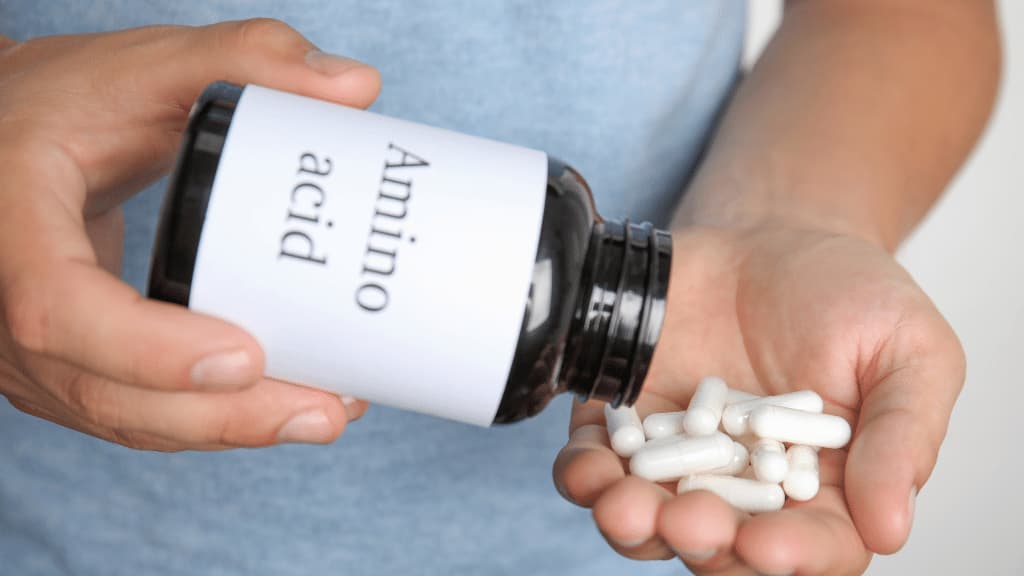Does Creatine Make You Gain Weight?
“Does Creatine Make You Gain Weight?” was written by Karina Tolentino, RD & edited/reviewed by Aly Bouzek, MS, RDN. Karina is a dietitian and blogger at Dietitian Karina.
You may have read on the internet that creatine causes weight gain.
Creatine is popular as a supplement amongst athletes that improves strength and athletic performance. So why would it cause weight gain? Let’s learn more about this topic together.
This article will clarify what creatine is, if creatine causes weight gain, and who should use it.
What is Creatine?

You can find creatine in your muscles.
Creatine is an amino acid that is stored in your muscles and helps your muscles create energy that your body can use.
Your kidneys, pancreas, and liver actually create creatine every day.
It’s naturally found, in small amounts, in seafood and red meat.
The primary function of creatine is quick energy for muscle contraction (like during intense exercise, sprinting, or heavy lifting).
As such, it is common for athletes to take a creatine supplement to aid in performance, recovery, and to grow their muscle mass.
What Does Taking Creatine Do?
Creatine supplements are usually taken by athletes in high-intensity sports. This is because of creatine’s positive effect on improving exercise performance, enhancing exercise recovery, and preventing injury. (1,2)
Numerous studies show that creatine benefits athletes and people who want to delay the development of a disease or are in rehabilitation from an injury. (1,2)
Let’s take a look at how creatine can be helpful to our health:
| Health Conditions | Research-based Evidence |
| Bone health | Creatine helps to prevent complications from decreased bone density and loss of skeletal muscle, known as sarcopenia. (2) |
| Skin health | Studies have shown that topical creams with creatine can help with skin sagging and premature skin aging. (2) |
| Brain health | It is well known that creatine supplementation can increase brain cognition. (3) But research has also shown that creatine supplementation may help reduce trauma from a brain injury, may help prevent stroke, and may help reduce damage caused by a stroke. (1,2) |
| Diabetes | Evidence suggests that creatine supplementation combined with a regular exercise routine helps in managing blood sugar and reducing HbA1c for those with type 2 diabetes. (2,4) |
| Musculoskeletal Injury | Athletes can benefit from creatine for sports-related injuries such as concussions. But creatine supplementation can also be beneficial for older adults following an injury. Although more research is needed, evidence shows that taking creatine after an injury can lessen muscle loss related to immobility. (2) |
| Anticancer and immunity properties | Creatine in the body is a source of energy that is important for immune cell production and supports a healthy immune system. (2) Creatine supplementation may also be beneficial in supporting T cell-based cancer immunotherapies. (5) |
Does Creatine Make You Gain Weight?
Now, on to the big question: does creatine make you gain weight? The answer is yes, but also no. Let’s dig deeper.
Water Weight
Yes, creatine can cause weight gain; however, the weight gained is not fat. Because creatine holds onto water inside the muscle, the weight gain (or feeling puffy) could partly be from water weight. (6)
This effect is usually seen within the first several days after starting a creatine supplement and during short-term usage of the supplement. (6)
Muscle Mass

In terms of muscle mass, creatine can aid in increasing muscle mass over time. (6)
Research shows that using creatine alone might help with muscle fatigue, but you will likely not experience a large increase in muscle strength and muscle performance. (7,8,9)
Instead, to increase muscle mass (and gain weight), you will need to include regular exercise with your creatine supplementation.
Initial weight gain will likely not be from increased lean muscle mass since it takes time and routine exercise to gain strength and grow muscle mass.
Over time, as you consistently take creatine and exercise, you may gain weight as your body’s lean muscle mass increases.
Fat Mass
Let’s not forget about fat mass. Numerous studies have shown that creatine does not increase fat mass. (6)
During a 2019 study, 19 articles were studied (609 subjects total) for changes in fat mass correlating to creatine and exercise in adults that were 50 years of age or older. (10)
Results from this study showed that those who took creatine (as compared to the placebo group) during their resistance training exercise had a larger decrease of body fat percentage. (10)
Who Can Take Creatine?
As we have learned, athletes are just some of the people who can benefit from a creatine supplement. Additionally, adults from all age groups* can use creatine to gain muscle strength, to help manage a disease, or to promote good health.
*Always speak with your doctor or a registered dietitian before starting a supplement or an exercise routine. These healthcare professionals will be able to determine your health status and if creatine is safe for you.
Since creatine is found in seafood and red meat, vegetarians may also benefit from regular creatine supplementation to help meet their daily nutrient needs.
Conclusion: Does Creatine Make You Gain Weight?
Creatine is an amino acid stored in our muscles and is known to be used to improve athletic performance and to increase muscle mass. Creatine supplementation has been found to cause short-term weight gain related to water weight, but not an increase in fat mass.
With regular exercise and creatine supplementation, you may gain weight due to increased muscle mass.
Creatine supplementation is also helpful in improving recovery from injuries, and improving bone, brain, and musculoskeletal health. Also, creatine supplementation can help manage type 2 diabetes, cancer, and improve skin health.
Remember to speak with your doctor or a registered dietitian. And as always, good luck on your weight gain journey!
